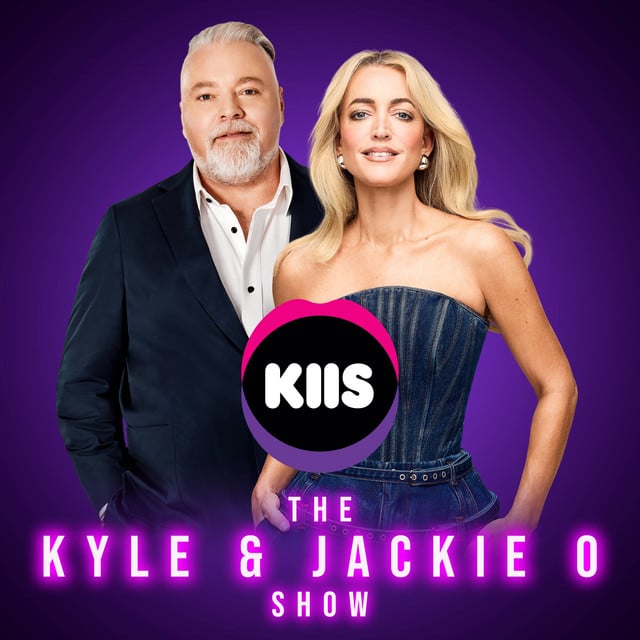Tuesday March 25, 2025

What the Trump administration’s group chat leak teaches us about crisis communications
A US magazine editor appears to have been sent classified military plans after President Donald Trump’s national security team accidentally included him in their group chat.
The breach, reported by Jeffrey Goldberg of The Atlantic, who was accidentally included in the Signal group chat, also included Vice President JD Vance, Defence Secretary Pete Hegseth, Director of National Intelligence Tulsi Gabbard, and Senator Marco Rubio.
Goldberg gained access to conversations about U.S. military operations against Houthi positions in Yemen, including the identity of a senior CIA officer, before realising the error and removing himself from the chat.
While the focus is on national security, this incident serves as a reminder for media, marketing, and government communications teams worldwide, especially those relying on encrypted messaging apps for sensitive information.
A wake-up call for communication practices
Caleb Yorke, CEO of Influence Haus, an Australian and international communications firm that also specialises in crisis communications, believes this error, though shocking, isn’t exclusive to politics.
“It’s easy to see how a communications team could mistakenly add an outsider to a confidential conversation. Instead of military actions, it might be product recalls or marketing missteps, or even the simplest of an accidental ‘CC’” Yorke explained.
“I myself, have been accidentally CC’d into a confidential email from a well-known celebrity and businesswoman discussing highly confidential information about the business and its dealings and contracts with one Australia’s major retailers.
“Just because an app is encrypted doesn’t guarantee security. Real security depends on the people, processes, and pressures they face. It is vital to always ensure that triple check before sending any non-secure communications via any type of third-party app such as Signal,” he added.
A culture of complacency
The leaked messages showed a mix of strategic planning and casual joking, with officials exchanging celebratory emojis after top secret military operations. Vance’s comment – “I just hate bailing Europe out again” – was met with laughs, despite the serious nature of the statement.
Yorke said this reflects a concerning trend: complacency and ill-thought-out plans for execution during high-pressure situations or time-sensitive events.
“Imagine a marketing team discussing sensitive information in a pitch thread shared accidentally with a client… It doesn’t just create operational headaches, it risks trust and reputational damage.”
Lessons for Australian brands
While few Australian companies will coordinate military actions through chat apps, the lessons from this incident are important for local agencies and communications professionals. Here are three key points Yorke says to consider:
- Evaluate your channels: Is your communication tool appropriate for sensitive conversations? Ensure invite links or numbers are properly vetted and approved by preferably a single administrator.
- Conduct regular access audits: Are you clear on who’s in your channels on platforms like Slack, WhatsApp, Signal, or Teams?
- .Establish human checkpoints: Designate team members to ask, “Is this the right place to talk about this?”
“At Influence Haus, we have strict policies and procedures on how data, information and communications can be stored and distributed, and have multiple policies in place to ensure that no sensitive material is ever accessed outside of the agency,” Yorke added.
The ABC has confirmed the authenticity of the group chat with the White House’s National Security Council.
“At this time, the message thread that was reported appears to be authentic, and we are reviewing how an inadvertent number was added to the chain,” spokesman Brian Hughes said in a statement.
The White House has confirmed the leak is under review, though no disciplinary actions have been announced.

What to expect from the first radio ratings of 2025
As the radio industry gears up for its first ratings survey of 2025, expectations are being tempered by realism.
With the dust settling on a tumultuous 2024, industry eyes are keenly focused on whether established giants will maintain their dominance or if new contenders will emerge.
Mediaweek Australia delves into the predictions and key talking points surrounding this highly anticipated release, drawing on insights from radio expert Craig Bruce.
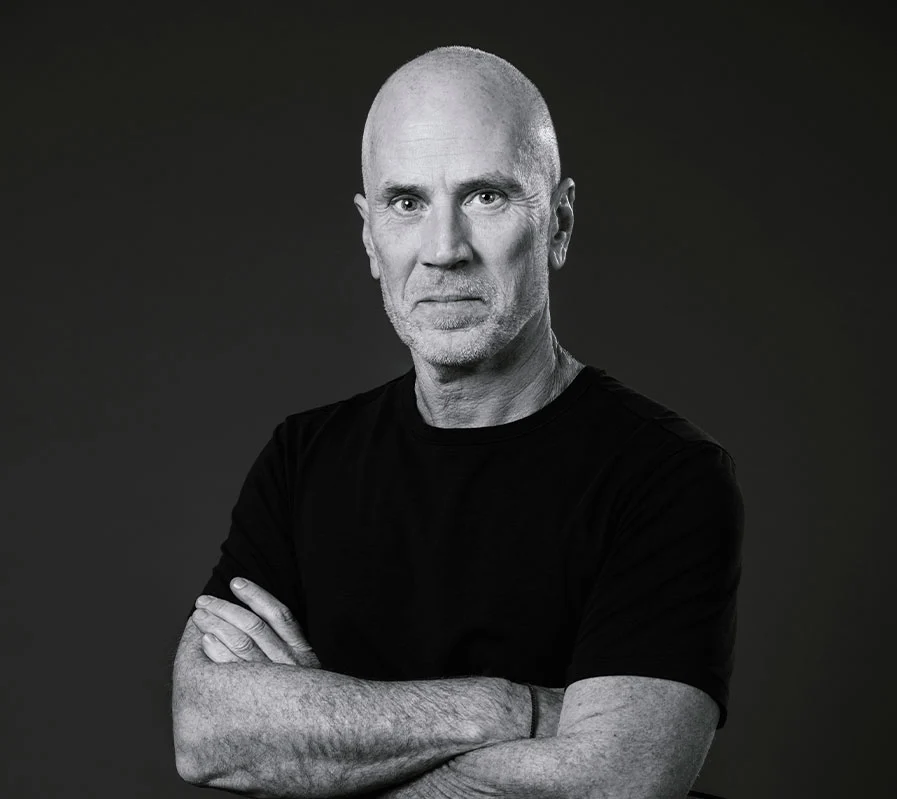
Radio expert Craig Bruce
Jase & Lauren hold Melbourne
Last year delivered one of the most closely watched shifts in Australian radio history, as the Australian Radio Network’s (ARN) The Kyle & Jackie O Show expanded into Melbourne via KIIS 101.1.
The Sydney duo entered the market with high hopes, but the move cost them over 200,000 in cume.
“Having lost more than 200,000 in cume in 2024, the best Kyle and Jackie O can hope is the ship’s steadying,” Bruce notes, highlighting the challenges faced by the duo in establishing a foothold in a new market.
The question remains, as Bruce states, “whether any radio show from Sydney can ever work in Melbourne. The answer will likely be no based on last year’s emphatic result.”
In contrast, Jase & Lauren on Nova 100 maintained a dominant position and are widely tipped, by Bruce, to hold the #1 breakfast spot in Melbourne again. The pair finished 2024 as the city’s number one breakfast show with an 11.5 share.
“In Melbourne, it’s hard to see any significant changes after a year in which listeners have found their feet with the new landscape,” he observes.
Meanwhile, stations like Gold 104.3 and Fox FM are expected to round out the top three. Triple M Melbourne has also rolled out a new breakfast show, and while early days, Bruce believes the goal will be retention rather than revolution.
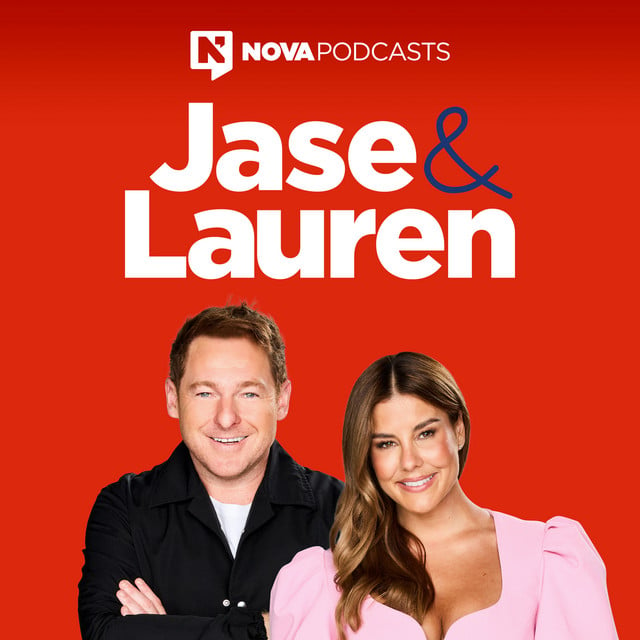
Kyle and Jackie O’s continued Sydney dominance
Despite their struggles in Melbourne, Kyle and Jackie O are predicted to continue their FM dominance in the harbour city. The pair ended 2024 with 13.5% share, taking home the FM breakfast crown.
Bruce suggests their content adjustments, tailored to appeal to a broader audience, will further solidify their position. “They have adjusted their content this year to be much more appealing to their Melbourne audience, and the end result is that the show sounds much better, so there’s no reason why the Sydney results won’t reflect this,” he explains.
However, Bruce acknowledges the brand damage incurred in 2024. “They have improved but did so much damage to the brand last year,” he cautions.
The long game begins
Across the country, numerous new breakfast combinations launched in the lead up to Survey 1, including Nova Brisbane, 2Day FM, and Triple M Sydney. Bruce, however, anticipates a slow burn for these new shows.
“Many new breakfast combinations have launched nationwide but I don’t think we’ll see any of these shows have a dramatic impact in the first half of this year,” he predicts.
“Breakfast is a long game,” he adds. “It’s about consistent performance over time. Audiences rarely change their station unless they’re forced to.”
Bruce went on to highlight the enduring success of established shows like Jonesy & Amanda, and Fitzy & Wippa with Kate Ritchie, all poised for strong showings in 2025. “Radio audiences rarely change their favourite breakfast show or radio station unless they have to,” he concludes.
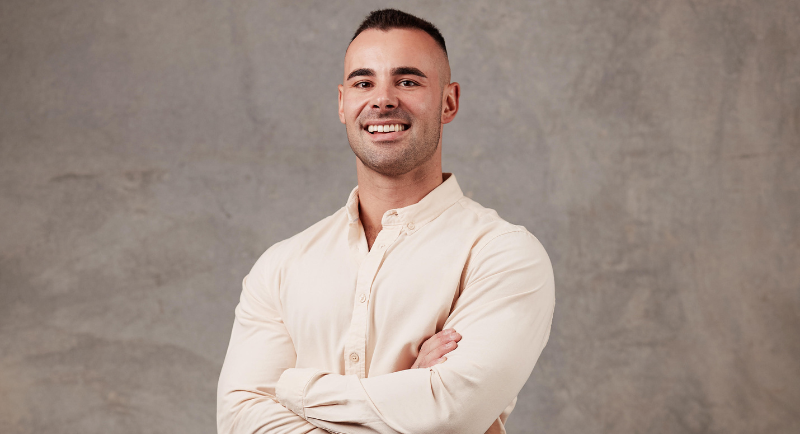
TFM Digital’s Taylor Fielding on why brands are turning away from Meta and Google to Local Area Marketing
Brands are increasingly turning away from Meta and Google in favour of Local Area Marketing efforts as a result of saturation on the platform, which has impacted business results and budget blowouts.
In a recently released report by TFM Digital, the independent agency examined the trends in targeting customers based on radius and how businesses have adapted their marketing approaches in response to digital advertising challenges.
Taylor Fielding, the author of the report and CEO of TFM, told Mediaweek that at the heart of this shift from brand is trust and results.
“Many of the marketers we spoke with had issues with transparency and results. Some had budget blowouts, while others had noticed a distinct drop in effectiveness of their ads.
“As part of the ‘Ditching Digital Skip Bins’ paper, we found that looking across the past couple of years for TFM Digital clients, CPMs have risen 10.31% on Facebook and Instagram.
“Meta’s reported cost per ad has increased 14% over the past 12 months alone, which I feel is down to the automated tech and the position of the platform in a lot of marketing mix models.”
He said that Google’s Pmax ads have continued to appear in questionable places on the internet and have raised concerns about brand safety and how the efficiency of getting ads out there has overridden the effectiveness of targeting.
“When all rely on the same platforms, with the replica personas, differentiation becomes a distant hope; in essence all of our efforts become a darker shade of AI,” he added.
The impact of automation and oversaturated platforms
Meta’s cost per ad across its platforms rose 14% year-over-year, which resulted in 90% of small and medium-sized businesses dealing with CPMs that are 10.31% higher than two years ago, according to Statista and TFM’s report.
Fielding noted the enshittification, or decline of online products and services decline in quality over time as a result of the shift in focus from attracting users and providing services to making businesses and monetising user base.
He said the resulting “drop in quality of experience and results for local area marketers has been paired with a rise in price for diminishing returns.”
Facebook has reached a saturation point and is no longer delivering the results marketers expect as business owners no longer get what they need. To this end, an “overreliance on automation” is being blamed.
Fielding noted the “platform has become saturated” and noted that one CMO said that they no longer use Meta because they we no longer seeing results, while others spoken about budgets breaking the bank without warning because of mismanagement on the back-end.
“Automated audience tools allow you to pull together something quickly. But when everyone, including your competitors, have access to the same sandbox, you’re going to end up with similar results with declining outcomes. Effectiveness was an issue which came up repeatedly,” he said.
How businesses account for nuances in marketing approaches
TFM’s report noted that businesses such as Telstra and Price Attack have adapted their marketing approaches in response to digital marketing challenges.
Aimee Madson, Price Attack’s CMO, said: “We had an experience on one channel, where our costs tripled and our results weren’t there. Times are tough. Retail is tough. So we have looked elsewhere – we can’t afford to waste money on a platform that doesn’t seem consistent anymore.”
Telstra’s senior marketing specialist, Anjela Gilbert said: “Our aim is always to hyper-target local areas to drive traffic into stores. We’re more than happy for them to educate people online, but we know that customers are more likely to purchase in-store. So that’s the job of our LAM. Drive traffic to where we can best convert.”
Feilding said understanding local area should be the primary concern when considering marketing efforts.
“That means accounting for nuances in a local area. Using hyper-local messaging which resonates. The same message won’t feel as personalised in Ballarat when it was designed for Toowoomba.
“Continual evaluation of your marketing mix to ensure you’re delivering against your objectives will help keep you on track.”
He also highlighted the importance of understanding the role of LAM for a brand.
“For the likes of Telstra, we’ve heard that it’s about getting people in store where they’re more likely to convert. For both of those brands, we know that community engagement is super important – making sure that the local store feels representative of the local community.
“The way that engagement best takes place will vary depending on regional and community nuances.
Making the shift to LAM
For marketers looking to make a shift in local area marketing that is effective, Fielding highlighted the importance of having a solid understanding of the target audience, with the relevant data and insights about them, along with having a strategy works smarter to reach that audience.
“Some of our most successful campaigns have had an insight at the core which we’re then able to build a strategy around (e.g. consumers are more likely to click an ad about massage than a generic wellness one).
“Getting the basics right across your marketing mix will help deliver against your objectives. This starts with hygiene-level stuff around audiences and segmentation.”
He also suggested that marketers should look into improving mental availability within the intended audience and discerning how best to stand out in your category on a given channel is paramount.
“We have found that digital OOH, mobile-targeted digital audio and even SMS have been very successful for clients looking to get customers in-store.”
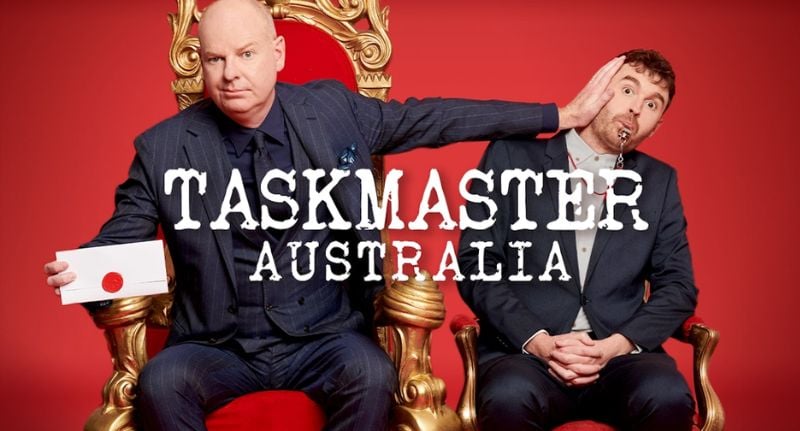
How Ten cracked the ‘Taskmaster’ code for Australian audiences
When a format like Taskmaster crosses borders, it brings two things: global familiarity and serious creative risk.
In the UK, the show is a cult phenomenon, anchored by the iconic duo of Greg Davies and Alex Horne. Translating that absurd magic into something that resonates with Australian audiences is a delicate balancing act. But according to Sarah Thornton, head of non-scripted, Paramount Australia, it’s an experiment that’s paid off.
“Obviously, it was a format, so there’s a bit of safety there,” Thornton told Mediaweek. “But making the Australian version was definitely complicated, especially with a comedy that’s so based on the chemistry of its hosts. We asked ourselves: is it possible to make an Australian iteration of that and make it successful?”
Turns out, the answer was yes, with strategy, persistence and a touch of luck.
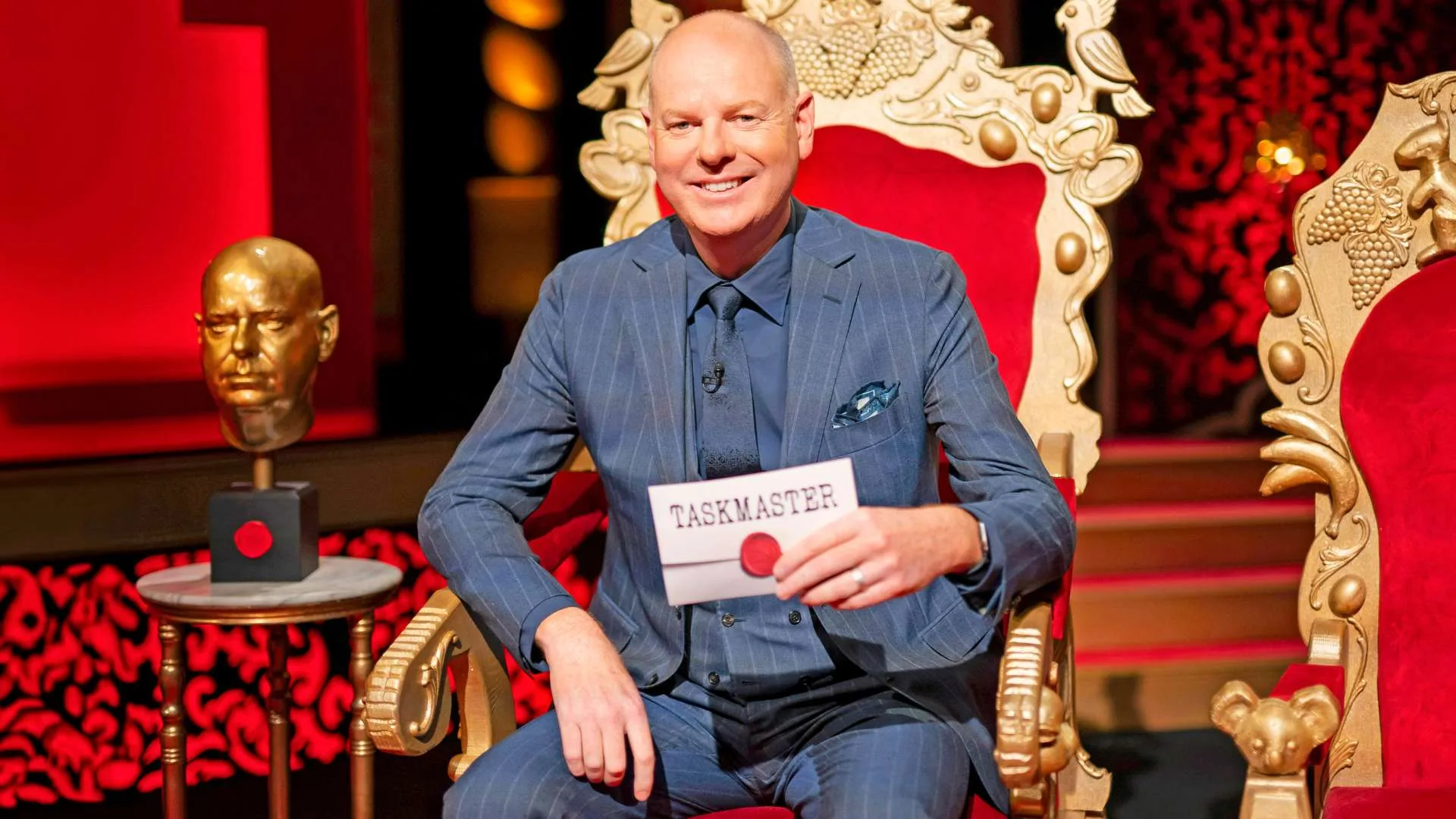
‘Taskmaster’ Tom Gleeson
The Gleeson effect
Landing Tom Gleeson as the Aussie Taskmaster was, for Thornton, a major turning point. His dry, deadpan authority brought instant credibility to the local version, but that casting coup didn’t happen by accident.
“It took a lot of hard work behind the scenes to get Tom, but he wanted to do it,” Thornton said. “He knew the format from the UK, and he could see it was a good fit for him.”
The final deal was the result of a unique collaboration between production partners, Token Group, Network 10, and the ABC. “We had to work really closely with Jennifer Collins at the ABC, and between that cocktail of people, we came up with a way to make it work. But I felt very safe once we had Gleeson on board. The show was in very safe hands, and he just keeps getting better every season,” Thornton said.
Learning from a misfire
Taskmaster’s US version only lasted one season, a rare flop for a format that has otherwise thrived in global markets. Thornton says that experience was actually invaluable for the Australian adaptation.
“It’s never nice when a show doesn’t work, but we were lucky to have that blueprint. The US version made some clear decisions that didn’t pay homage to the original, but also didn’t localise it in the right way either,” she said.
That insight helped inform every creative choice for the Australian run, from the tone to the writing to the challenges themselves. “We don’t use any of the UK tasks,” Thornton said. “They’re all new, and they’re designed with an Australian spin in mind.”
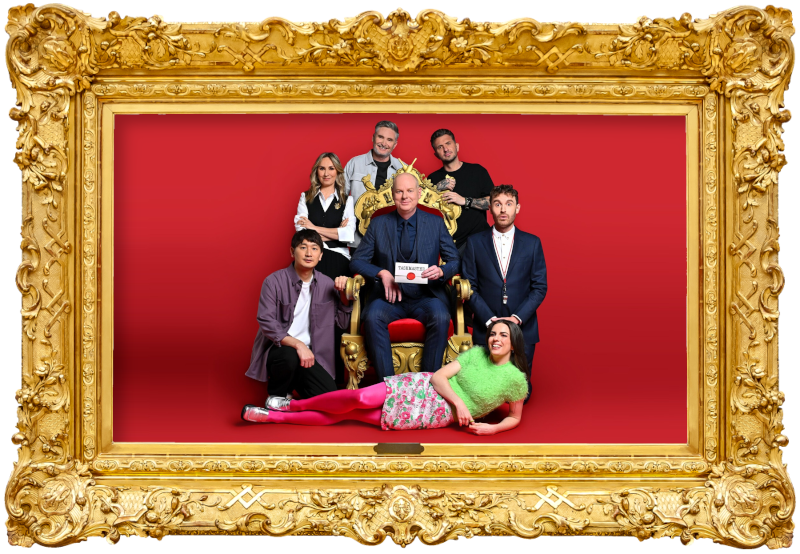
The assistant with his own flavour
One of the format’s wild cards is the Taskmaster’s assistant. In the UK, Alex Horne, who also created the show, plays the straight-faced foil to Greg Davies. In Australia, that role belongs to Tom Cashman, and while the dynamic is different, the result still lands.
“I’d say Cashman has done a great job developing his own flavour of assistant,” Thornton said. “It’s definitely different from Alex in the UK or Paul Williams in New Zealand. He’s got this pedantic nerd energy that works really well for Australia. And he has more screen time than the Taskmaster, which shifts the tone.”
The creative team also continues to have strong ties with Horne himself. “Alex reads through all the tasks, and he’s amazing, so generous with his time and available for feedback. By season four, I think he’s very comfortable with what we’re doing,” said Thornton.
Comedy with brand power
Thornton believes Taskmaster Australia has found its sweet spot between absurdism and relatability, a mix that’s resonated with local audiences and made it a bright spot in the network’s unscripted slate “There’s an amazing power play between the host, the assistant and the comedians” Thornton said. “It’s very specific, and we’ve managed to recreate that chemistry here with an Australian tone.”
She added: “We want to continue tonally to maintain the balance we’ve achieved. Every season, we ask: do we need to tweak the live tasks? Can we be more visual? How do we lift things 10%? But we’re confident we’ve found a formula that works, and the audience agrees.”
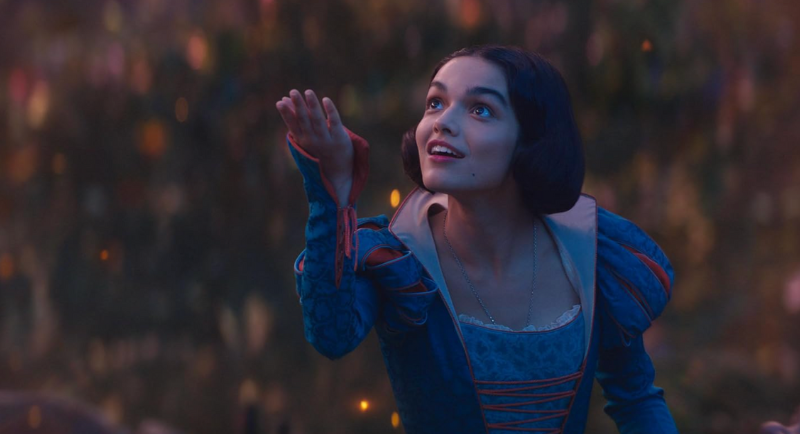
Box Office: Disney’s Snow White debuts at #1 as it claims the crown from Mickey 17
• This weekend, the Australian box office made $6,397,901 up +22% from last weekend’s $5,238,707.
Top five
1. Disney’s Snow White
Disney’s Snow White is the live-action musical of the 1937 animated film. The film makes debuted in the number one spot on the Australian Box Office over the weekend and grossed $2,827,707 after screening across 542 screens. The film is directed by Marc Webb, produced by Marc Platt, with Callum McDougall as executive producer, and features new songs by Benj Pasek and Justin Paul.
Synopsis: Rachel Zegler stars as Snow White and the film centres on her journey to free her kingdom alongside the seven dwarfs, Bashful, Doc, Dopey, Grumpy, Happy, Sleepy, and Sneezy, from her ruthless stepmother, the Evil Queen, played by Gal Gadot.
Total Australian Box Office gross to date: $3,000,884
2. Mickey 17
Mickey 17 grossed $730,411 in its third weekend in the Australian box office after screening across 329 cinemas. Last weekend the film made $1,226,934, representing a drop of -40%. To date, the film has made $4,724,331.
Synopsis: The film, based on Edward Ashton’s novel Mickey7, stars Robert Pattinson stars as Mickey Barnes, an “expendable” crew member on a perilous mission to colonise an ice planet. He is assigned to high-risk tasks since he can be regenerated with his memories mostly intact. However, after one resurrection, something goes terribly wrong.
Total Australian Box Office gross to date: $4,724,331
3. Black Bag
The star-studded spy thriller, featuring Naomie Harris, Regé-Jean Page, and Pierce Brosnan, dropped down one spot to bag third at the box office in its second week at Australian cinemas. It made $676,895 over the weekend after screening across 324 screens, grossing -26% from the $911,915 made last week.
Synopsis: Black Bag centres on intelligence agents George Woodhouse (Michael Fassbender) and his wife Kathryn (Cate Blanchett). When she is suspected of betraying the nation, George must choose between his marriage and his country.
Total Australian Box Office gross to date: $1,912,173
4. Bridget Jones: Mad About the Boy
The romantic comedy is now in its sixth week in Australian cinemas and continues to hold its position in the top five ranking films, coming in a number four this week. Over the weekend, the film grossed $506,655 across 295 screens this weekend, down -37% from $806,839 earned last week across. To date, the film has grossed $15,577,191.
Synopsis: Renée Zellweger reprises her role as Bridget Jones. Now a single parent, Jones balances parenting two young children, a demanding career, and the chaos of modern dating as she finds herself torn between a younger admirer (Leo Woodall) and the unexpected possibility of romance with her son’s science teacher (Chiwetel Ejiofor).
Total Australian Box Office gross to date: $15,577,191
5: Captain America: Brave New World
The Disney’s Marvel Cinematic Universe film continues to keep its foot in the top five films at the Australian Box Office, this time in fifth position. Captain America earned $335,239 over the weekend after screening across 221 cinemas, down -41% from last week’s earnings of $563,930. The film as grossed $13,428,437 throughout its run in Australian cinemas.
Synopsis: With Sam Wilson (played by Anthony Mackie) taking over as Captain America from friend Steve Rogers (Chris Evans), he finds himself at the centre of an international incident after meeting with President Thaddeus Ross. Wilson and the new Falcon, Joaquin Torres (played by Danny Ramirez) are thrust into a crisis and must uncover the motive behind a sinister global scheme.
Total Australian Box Office gross to date: $13,428,437
Top six to 10
6. Flow
7. Locked
8. Alto Knights
9. Ne Zha 2
10. A Complete Unknown
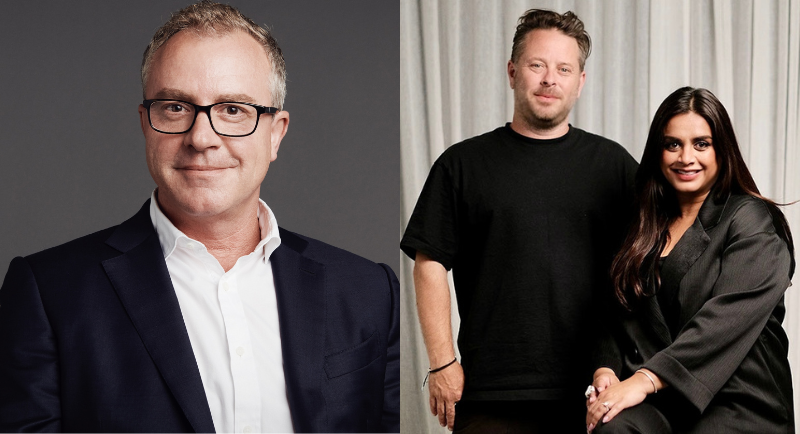
DDB Group AUNZ president Andrew Little steps down; NZ’s Priya Patel and Matty Burton take on expanded roles
DDB Group AUNZ has unveiled new leadership with Andrew Little, regional president, stepping down after 25 years and New Zealand’s Priya Patel and Matty Burton taking on expanded roles.
Little started as managing director of DDB Melbourne and was promoted to CEO DDB Group Australia in 2013. This was followed by a promotion to president and CEO ANZ in 2021. His partnerships with Westpac (13 years), McDonald’s (56 years), Coles (two tenures) and Volkswagen (27 years) mark some of the most consistent and successful agency-client relationships in Australia.
“I have always thought that leading DDB is a privilege, not a job and have treated this company like it was my own,” Little said of his tenure.
“I have also been fortunate to see DDB graduates become CEOs, CCOs and heads of departments around the world – this is one of the real joys of a long tenure. I have made lifelong friends with clients and even competitors. But mostly I would like to thank my DDB family – those wonderful people who have supported me through the years.”
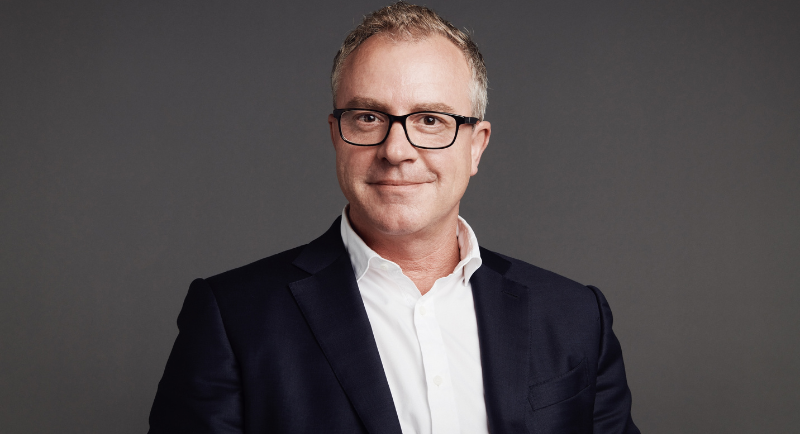
Andrew Little: ‘I have also been fortunate to see DDB graduates become CEOs, CCOs and heads of departments around the world – this is one of the real joys of a long tenure.’
Alex Lubar, DDB Group Global CEO, said: “Our agencies in Australia and New Zealand have always been some of our strongest, most creative offerings in the global DDB network. I have no doubt that this leadership team will chart enormous creative success and growth for the future.
“I would like to thank Andrew for leading through some of our most impressive years in the region. He’s had a profound impact on the business and will be missed by all of us at DDB. Andrew will be here to support Priya, Matty and clients until August 2025.”
Stepping up to take expanded roles are New Zealand CEO Priya Patel and New Zealand chief creative officer Matty Burton taking on expanded roles in the region effective April 1st. Patel extends her responsibility to regional CEO with Burton moving into the newly created role of chief creative officer for DDB Group AUNZ.
This marks a continuation of the duo’s partnership at DDB Group Aotearoa in New Zealand where they have worked together since 2021. Under their leadership the agency has enjoyed sustained creative and commercial success; including 20 Agency of The Year titles, 14 Cannes Lions, and nine D&AD Pencils, including New Zealand’s second ever Black Pencil.
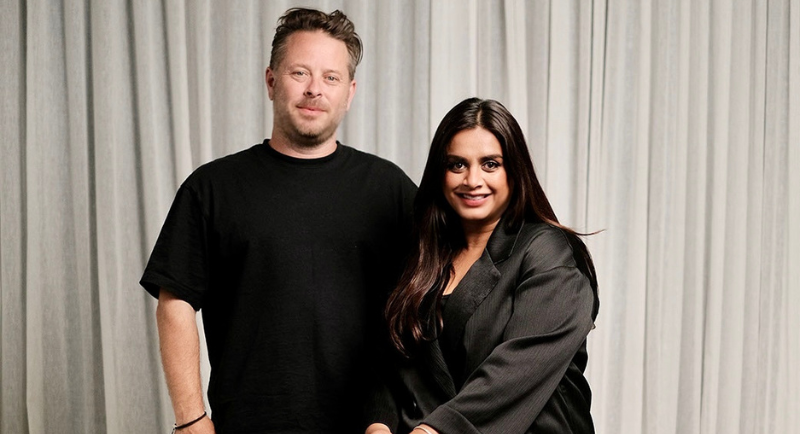
Priya Patel: ‘Our vision is simply to create more unity between the amazing humans in Australia and New Zealand.’ Matty Burton: ‘We want it to be inspiring and rewarding – giving everyone new opportunities, challenges and clients to work with.’
The pair will continue to be based in New Zealand, overseeing the agency and its clients, as well as partnering with the DDB Melbourne and DDB Sydney leadership teams.
“Each of our offices is unique and has its own strengths and talents,” Patel said. “To date, we have all worked relatively siloed, but there are exciting opportunities for us to come together and integrate more for the benefit of our clients – like a modern, creatively powerful, Antipodean mini network within the worldwide network. Our vision is simply to create more unity between the amazing humans in Australia and New Zealand.”
“In Napa [Mike Napolitano, CEO DDB Melbourne] and Marj [Sheryl Marjoram, CEO DDB Sydney], I have two super-smart partners who are well connected into clients and the best talent in the region, and I can’t wait to work even more closely with them. And I am, of course, deeply grateful to Andrew for bringing me into DDB and his continual support over the last seven years.”
Burton added: “Both Priya and I have worked in and love all three cities and believe we just need to connect the right people at the right time. We want it to be inspiring and rewarding – giving everyone new opportunities, challenges and clients to work with.”
Top image: Andrew Little, Matty Burton and Priya Patel
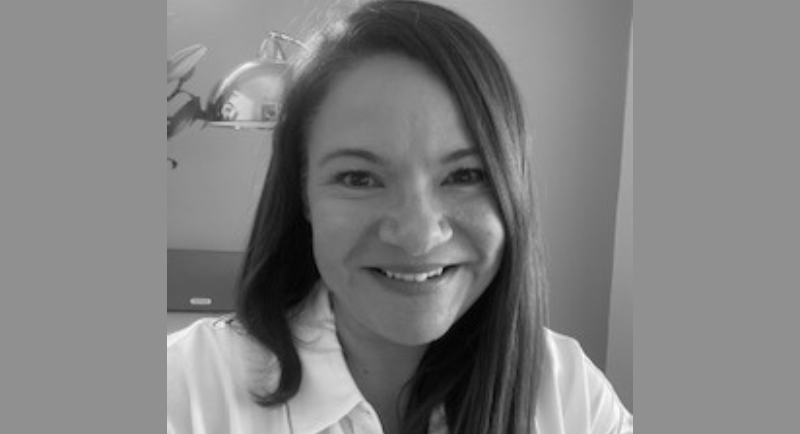
IAB appoints chair of Executive Technology Council
IAB Australia has appointed Microsoft Advertising’s Nicole Prior as chair of its executive technology council (ETC) and also become the ETC representative on the IAB Australia board.
Prior, who is head of media and adtech solutions APAC of Microsoft Advertising, replaces Adele Wieser, MD of Index Exchange, who has completed her two-year stint as chair.
Prior brings almost thirty years of experience in the industry to her role working across agency, adtech and publisher side. Previously she worked with Xandr, UM Australia, Mediacom, Starcom and Seven Network.
The IAB Executive Technology Council is focused on identifying and addressing critical issues in advertising technology innovation, providing key insights, leadership, and strategic guidance with a particular focus on the digital value chain. A key priority for ETC is developing and upskilling the industry by guiding the IAB Mentorship Program. It also works in a collaborative manner with IAB Australia’s technology-focused councils on several of the ongoing projects, most recently delivering definitions and guidance around Made for Advertising sites.
The ETC includes representatives from media and technology companies including Carsales, Cartology, Google, GumGum, Half Dome, Index Exchange, InMobi, Integral Ad Science, Kinesso, LiveRamp, Magnite, Microsoft Advertising, News Corp Australia, Nine, OpenX, Publicis Groupe, PubMatic, REA, Seven, StackAdapt, The Trade Desk and Yahoo!
Gai Le Roy, CEO of IAB Australia, welcomed Prior’s appointment and said: “Nicole’s depth of knowledge and experience across agency, publisher and now adtech, made her the ideal candidate to lead the IAB Australia Executive Technology Council. Her input into the IAB Board on behalf of the ETC and independent ad tech will be invaluable.”
Prior said of her new role: “I’m honoured to be appointed as the Chair of IAB Australia’s Executive Technology Council and look forward to working collaboratively with all members of the ETC on strategic initiatives to support the industry, and the many talented people that work within it.”
Top image: Nicole Prior
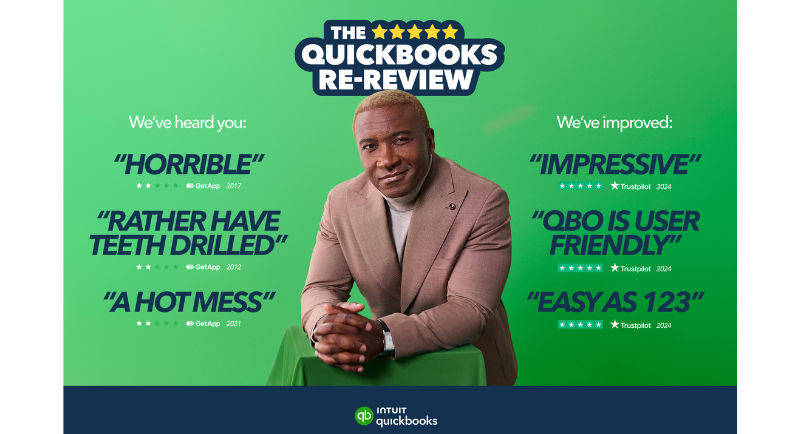
Intuit QuickBooks campaign confronts negative reviews via R/GA Australia
Intuit QuickBooks has teamed up with creative innovation company R/GA Australia to launch a campaign that does what most brands wouldn’t dare: confront the negatives of the past head-on.
As the challenger in the cloud-based accounting and financial management software category in Australia, Intuit QuickBooks is leaning into old perceptions, reviving past reviews – with the aim of dismantling them with undeniable proof that it is now efficient, powerful, and built to make their lives easier.
The challenge? Overcoming deeply entrenched perceptions. In-depth qualitative research with accountants around the country revealed many of them had deep scepticism based on their limited experience of the product many years ago.
The campaign aims to highlight how QuickBooks has evolved into an integrated suite of solutions that seamlessly manages workflows, automating tasks and empowering collaboration – all while giving accountants back their most precious asset – time.
Intuit QuickBooks and R/GA Australia launched a bold campaign that does what most brands wouldn’t dare: confront the negatives of the past head-on. The QuickBooks Re-Review leans into old perceptions, reviving past reviews – only to dismantle them with undeniable proof. Intuit QuickBooks is now efficient, powerful, and built to make their lives easier.
But the QuickBooks Re-Review isn’t just about revisiting old critiques; it’s about shifting behaviour. Those taking a second look are switching to QuickBooks, creating a ripple effect that’s encouraging others to follow suit and reconsider their views. Now, more accountants than ever recognise Intuit QuickBooks as a real contender.
Interviews with accountants revealed a saving of up to 30 hours a week using QuickBooks when one firm compared it to previous accounting software, another reporting year-end compliance that once took four hours now takes just four minutes.
“We approached this campaign from an accountant-first perspective, listening to their feedback on past inefficiencies and old reviews” said Kirsty Hollis, senior brand manager at Intuit QuickBooks.
“With over 100 product and feature improvements and an influx of positive reviews today, we felt it was time to shift those long-held beliefs and invite accountants to take another look at QuickBooks.”
Seamus Higgins, chief creative officer at R/GA Australia, added: “If someone has had a negative perception of you for a long time, you can’t expect to win them over by saying,’Hey, look at me, I’m great now’. Yes, you’ve got to earn their attention. But more importantly, you’ve got to earn their trust.
“I have huge respect for Intuit QuickBooks for being bold enough to go on that journey.”
Will Chapman, managing partner at Avenue C, said: “We have the challenge of ensuring that our message is seen by accountants, but reaching them isn’t enough without a bold, stand-out message. The QuickBooks Re-Review is exactly the brave approach we need to grab the attention of our core target and ensure that they give QuickBooks the second chance it deserves.”
The campaign rolls out across multiple channels from March 17th.
Credits
Client: Intuit QuickBooks
Senior Brand Manager: Kirsty Hollis
Director Marketing and Sales: Kieren Hutchings
Acquisition Marketing Lead: Kate Alderding
Head of Performance Marketing: Jess Thorning
Senior Marketing Manager: Jared Brintz
Creative innovation company: R/GA Australia
Managing Director: Victoria Curro
Chief Creative Officer: Seamus Higgins
Creative Director: Drew Singleton
Creative Director: Rachel Blacklaws
Group Account Director: Josh Agnew
Executive Content Producer: Kyle Belcher
Senior Producer: Sebastian Leat
Executive Strategy Director: Marie Conley
Strategy Director: Phil Johnston
Production partner: Entropico
Director: PAXI
Executive Producer: Kyle Blanshard
Producer: Shayle Guillory
DOP: Cem Hizli
Production Designer & Stylist: Jess Jacob
Photographer: Evo
Talent: Blessing Mokgohloa
Casting: Daniel Berini
Media agency: Avenue C, Sydney
Managing Partner: Will Chapman
Managing Partner: Melissa Mullins
Business Director: Anna Cox
Media Director: Clare Zappia
Digital Director: Chris Zoomerschoe
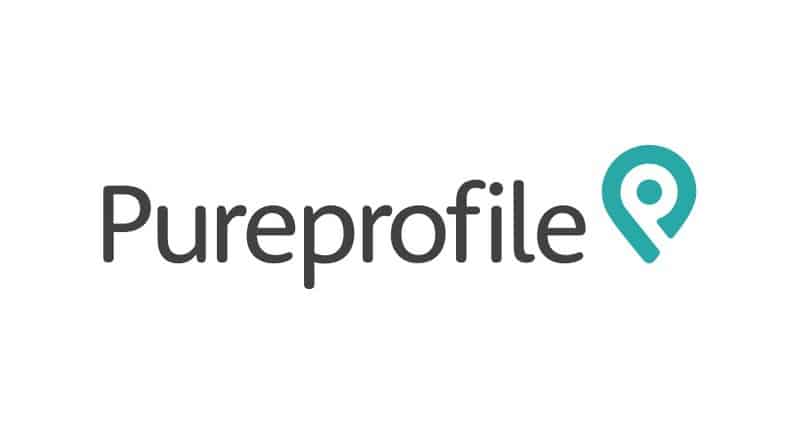
Pureprofile launches AI solutions to help brands and marketers decode online discourse
Pureprofile has introduced a suite of three new products, powered by Quilt.AI, to help brands and marketers put a research lens to online chatter, adding a layer of insight to consumer sentiment and emerging trends.
Brands are navigating a sea of online data and grappling with interpreting vast amounts of consumer conversations, search data and the open web. To decoding these conversations and leverage them for strategic decision-making the global data and insights company is address with three solutions that go beyond traditional social listening methods.
The Pureprofile solutions filter through social media, news sites, blogs, search data and the open web and then use AI to decode and interpret consumer sentiment and cultural shifts through a research-driven lens. This reduces complexity by helping to make sense of this wealth of unstructured data to identify clear patterns and guide strategic decisions for consumer insights.
Social Meaning is an all-in-one AI analytics platform that turns unstructured online consumer data into actionable insights. By entering a query, users can leverage the power of advanced AI to seamlessly decode and interpret online, social and digital data through a research lens. This empowers researchers and brands to uncover insights that go beyond the surface of online consumer conversations, revealing deeper, more meaningful trends and patterns.
Emerging Consumer Trends helps organisations stay ahead by uncovering new online trends before they become mainstream. It uses advanced AI to analyse online conversations and track patterns across industries like Fashion, Food and Travel, such as highlighting emerging opportunities and insights for faster, more strategic decision-making.
Beauty Trends gives brands a powerful, data-driven solution to track emerging beauty movements across Australia and global markets. Using advanced AI, it analyses social media, search data, and online conversations to identify and validate key trends in fragrance, makeup and skincare so brands can stay ahead of the curve.
“So much of the modern consumer experience is shaped by online discourse, with the volume of raw consumer data being nothing short of astronomical – from the latest makeup look to viral recipes and self-care routines,” Niamh Fitzpatrick, chief product officer at Pureprofile said.
“Without a clear understanding of emerging trends across multiple markets, brands risk missing key opportunities, misallocating marketing spend, and failing to effectively engage their target audience.
“Our new solutions, in partnership with Quilt.AI, offer valuable insights into consumer sentiment, cultural shifts and trends before they enter the zeitgeist. Brands can track online conversation globally, and strategically prepare for product rollouts or targeted campaigns in Australia.
“By tapping into these tools, brands can make smarter, more data-driven decisions with confidence, ensuring they are ahead of the curve and responding to market dynamics in real-time.”
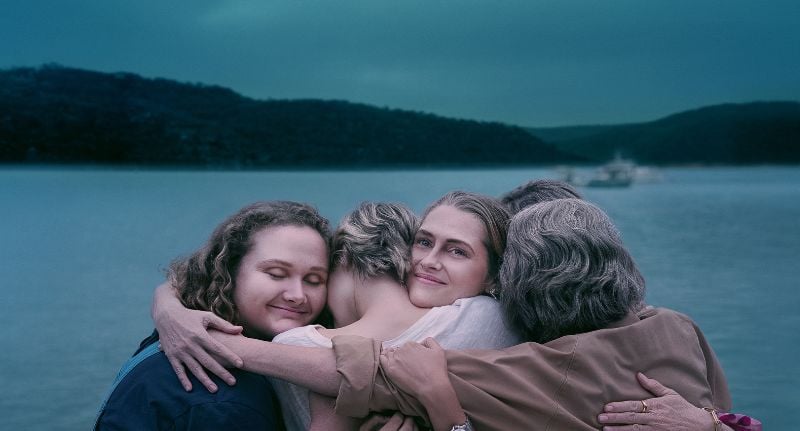
Foxtel and BINGE weave ‘The Last Anniversary’ into Australian gold
There is something uniquely magical about the Australian bush.
From the smell of the eucalyptus trees to the squark of rosellas that dart across the pockets of the sky above. It is both an enchanting and mysterious place, one Australians feel perfectly at home in and yet remain in awe of. It is this essence that the team behind Liarne Moriarty’s The Last Anniversary worked tirelessly to bring to the screen.
From the award-winning producers of Big Little Lies and Nine Perfect Strangers, Bruna Papandrea’s Made Up Stories, and Nicole Kidman’s Blossom Films, this is the first time one of Moriarty’s novels has been set and filmed in Australia.
A feat Foxtel Group’s head of scripted originals, Lana Greenhalgh, is bursting with pride over. “All her other novels were adapted for screen overseas,” Greenhalgh told Mediaweek. “But this time, we’ve kept it here. It’s the first time an Australian novel written by Moriarty has been produced, shot, and set in Australia – and I’m particularly proud of that.”
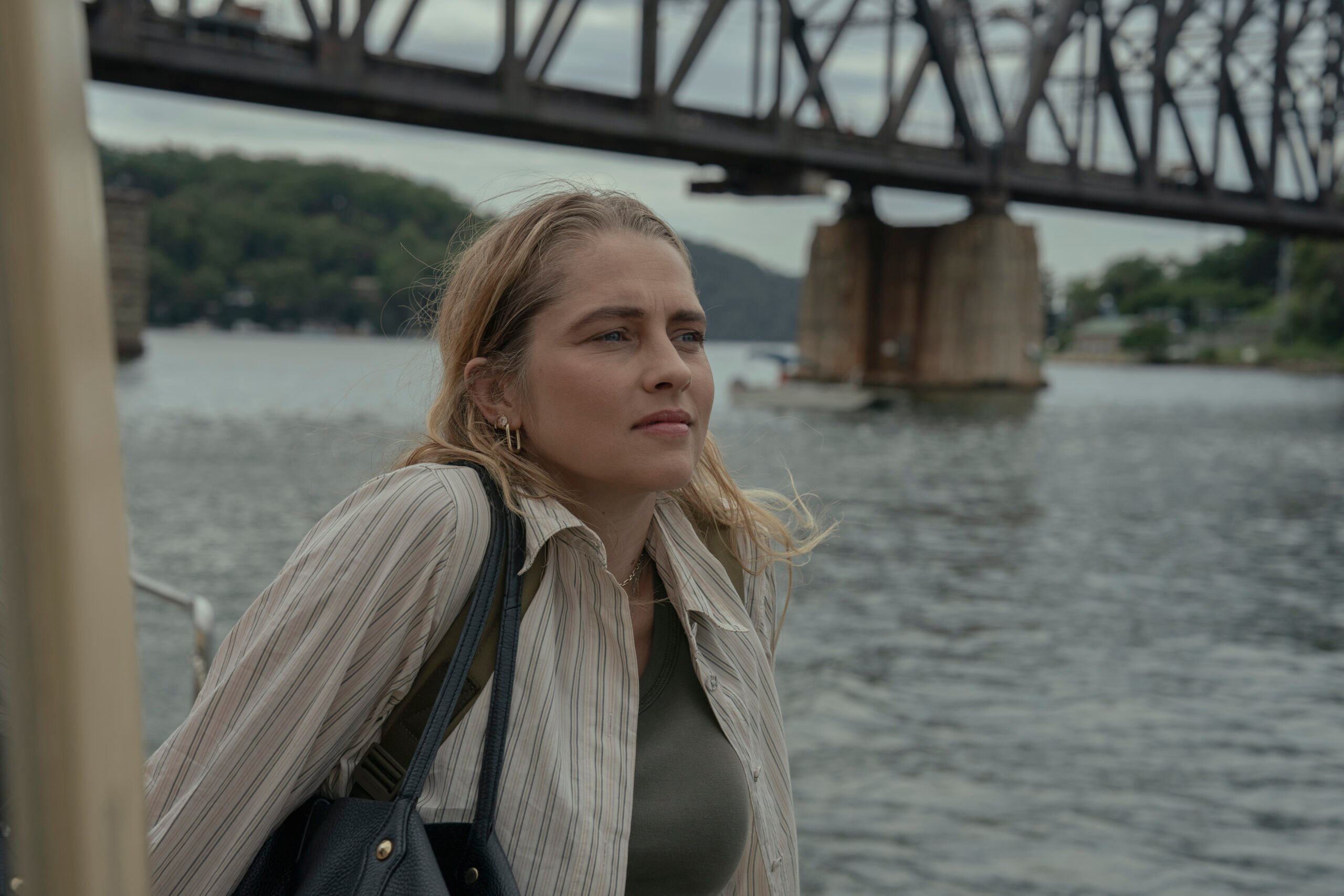
The Last Anniversary star Teresa Palmer
The Delicate Art of Adaptation
The adaptation process, led by Samantha Strauss and her team of writers, Sarah Walker, Giulia Sandler and Greg Waters was a labour of love.
“It takes years to adapt and break down a novel, pulling out the threads, story elements, and characters to bring these stories to the screen,” explains Greenhalgh.
For the team, maintaining the emotional core of Moriarty’s work was paramount. “Sam fell in love with Leanne’s characters. She was completely caught up in these beautiful, beautiful characters and thought, ‘I’m going to start there and bring them to life.'”
The result, says Greenhalgh is a character-driven narrative and storytelling experience that balances mystery with emotional depth.
While the source material offered five generations, the screen adaptation streamlines it to four, ensuring the propulsive mystery remains at the forefront. “We’ve minimised it to four just to make it a little bit more streamlined and make sure that propulsive mysteries are at the core at all times, but very proudly as well.”
A global team of titans
With Papandrea’s Made Up Stories and Kidman’s Blossom Films producing and John Polson directing, the production brought together global heavyweights with deep local roots. The New South Wales Government even supported the series through the Made in NSW fund.
“At the Foxtel Group, we pride ourselves on producing world-class, award-winning television,” said Greenhalgh. “So it was exciting to partner with Made Up Stories and Blossom. They also have impeccable taste, when you speak to them, they bring a level of sophistication that I admire.”
While the team’s international credentials are undeniable, Greenhalgh praised the way they leaned into the show’s uniquely Australian DNA. “They raise the bar. They’re bringing an international lens to a very Australian show,” she said.
Greenhalgh added that despite being across all corners of the globe and operating in different time zones, the collaborative spirit behind the production was admirable, with all parties deeply involved in every stage of the process.
“I’ve been working with this team for the last couple of years, and everyone was on the call for every single meeting, every single beat, where we all needed to lean in, offer an opinion, or offer our feedback,” she said.
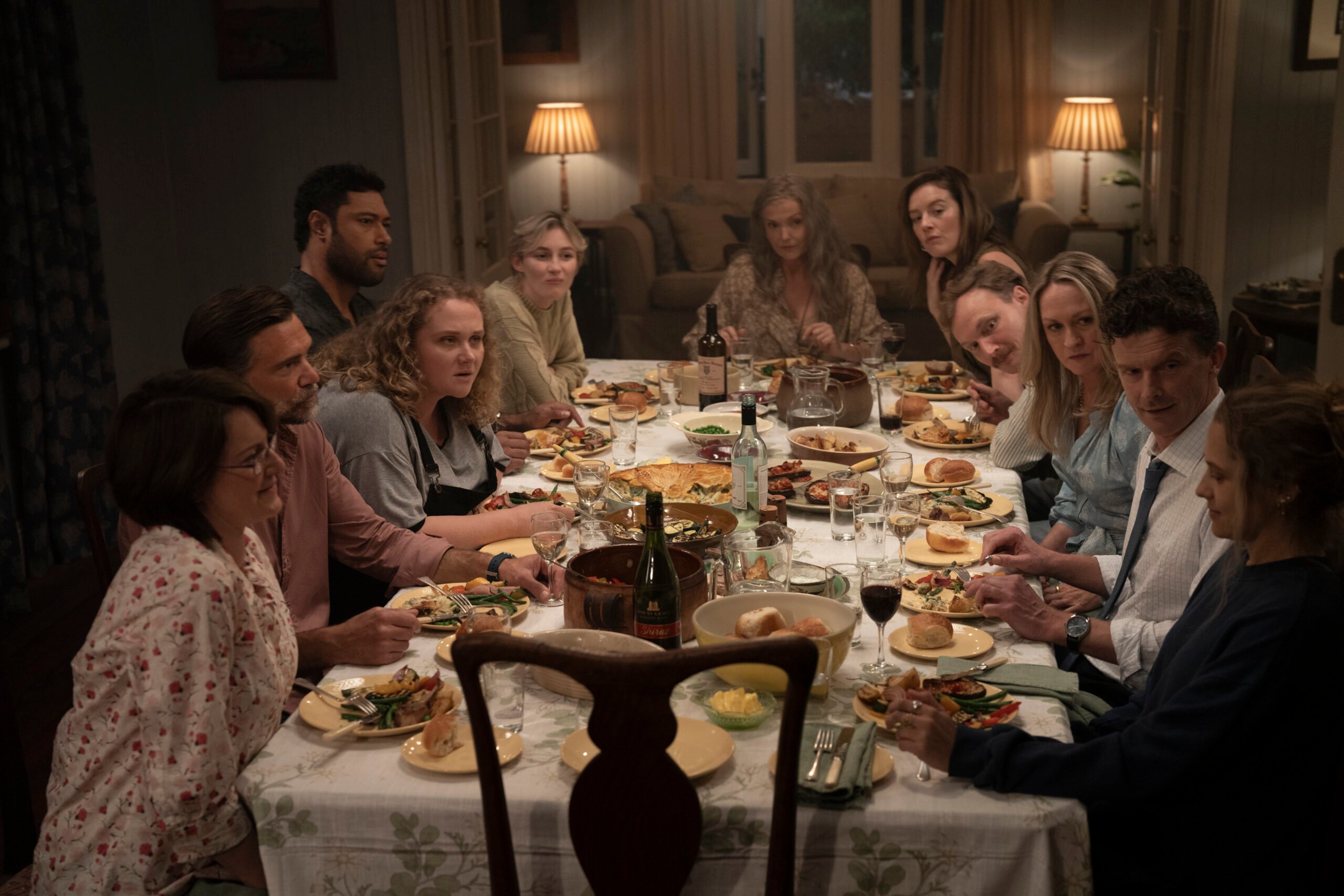
The Last Anniversary cast including Teresa Palmer, Miranda Richardson and Danielle Macdonald
A hunger for homegrown drama
Australians love seeing themselves reflected on screen, and Foxtel has the numbers to prove it. “Last year we found nine out of the top 20 shows on Foxtel platforms were local original productions,” Greenhalgh said.
Meanwhile, three out of the top 10 shows were local scripted Original series, while two out of the top three shows were local scripted Original series.
“Australians want to see themselves, and The Last Anniversary ticks a lot of those boxes. It has that distinctly Australian setting, a phenomenal creative team, a character-first approach, and a multi-generational family at its core,” she added.
For audiences on both Foxtel and BINGE, the show’s appeal is clear. “This kind of storytelling, elevated, relationship-driven, female-led drama, performs exceptionally well,” she said. “It connects across generations and across platforms. It’s premium, it’s heartfelt, and it’s anchored by mystery. Our viewers absolutely devour it.”
And while streaming audiences often lean toward full-season binges, The Last Anniversary is being rolled out weekly, by design. “We like to think about how people digest content,” Greenhalgh said. “This is a show where you watch an episode, sit with it, and then talk about it. It’s full of ‘I didn’t see that coming’ moments, perfect for water cooler conversations.”
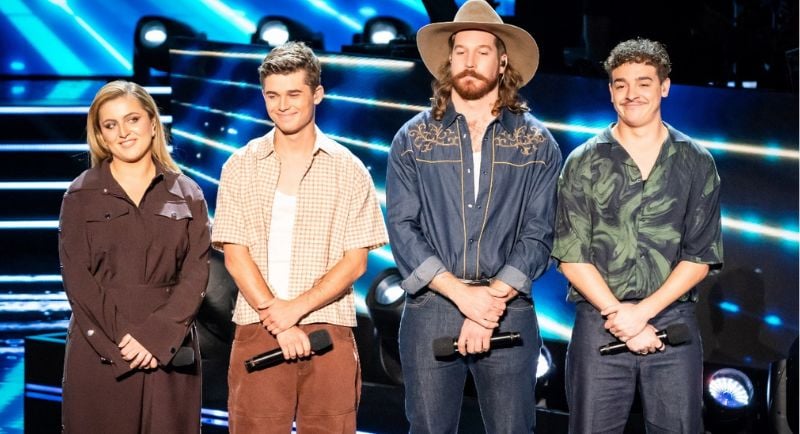
Australian Idol trims the competition as Top 6 revealed
Australia has voted, and Australian Idol has farewelled two more contestants in a high-stakes Sunday night elimination on Seven and 7plus.
After a powerful group performance of The Beatles’ Come Together, it was revealed that John Van Beek, 19 from WA, and Emma Jones, 23 from ACT, would not progress to the Top 6.
Joining them in the bottom four were Queenslanders Jake Whittaker, 30, and Jaymon Bob, 23, all of whom gave one last performance to sway the judges and the public. But the decision was final, no one would be saved.
No lifeline
With all eight contestants at risk, the judges, Marcia Hines, Kyle Sandilands, and Amy Shark, opted to let the vote decide. “We all wanted to save someone different, so we decided we would save no one. I think it’s fairer,” Sandilands explained.
Shark added: “It’s that really difficult time of the competition. Even when you have a good night, you just need Australia to vote.”
A return and a farewell
2024 winner Dylan Wright returned to the Idol stage with a charged performance of Mess of a Man, underscoring the platform’s power to launch careers.
Meanwhile, both John and Emma ended their Idol journeys on graceful notes. John said: “I was so nervous in the audition room but trusting the process I have learnt so much and met so many amazing people.”
Emma added, “I feel like I have grown as a person and an artist. It’s only the beginning.”
The Australian Idol Top 6
- Gisella Colletti 16, Perth, WA
- Iilysh Retallick 17, Culcairn, NSW
- Jake Whittaker 30, Stockleigh, QLD
- Jaymon Bob 23, Rockhampton, QLD
- Marshall Hamburger 19, Doonan, QLD
- William Le Brun 21, Melbourne, VIC
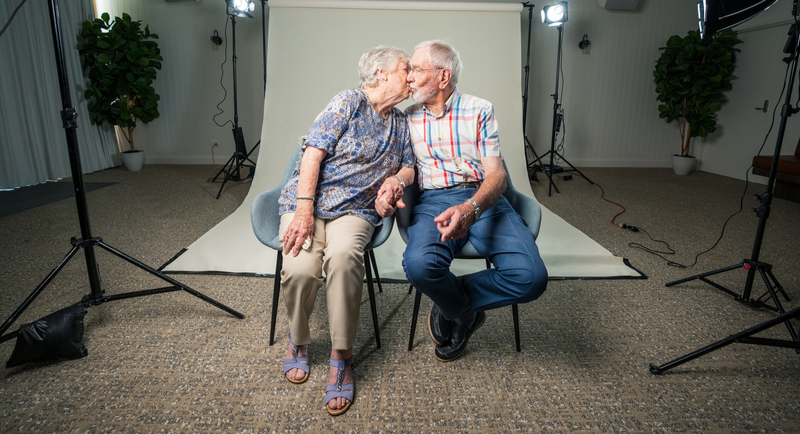
Anglicare Sydney reimagines seniors living in new campaign via Frost* Collective
Anglicare Sydney partnered with strategic creative studio Frost* Collective to launch a campaign for the final release of its premium residences at Woolooware Shores, Anglicare Sydney’s waterfront seniors community in the Sutherland Shire.
The newly launched brand identity for Woolooware Shores aims to shift perceptions of ageing and seniors living by showcasing empowered, active seniors living life on their own terms – activated across OOH and social.
Frost* Collective’s head of place, Cat Burgess, described the approach as a “perceptual shift away from traditional retirement village marketing, meeting older Australians where they are and how they want to be seen.”
DEC PR led the earned media campaign with the insight that ageism is rife in public discourse and older Australians are particularly besieged when it comes to prejudice and discrimination.
Integral to the campaign is the release of a compelling short documentary that challenges misconceptions and highlights the vibrancy of life for older Australians. Produced by Grainger Films in collaboration with project consultant Kirk Docker, the film draws inspiration from Docker’s critically acclaimed ABC series You Can’t Ask That.
Fourteen residents from Anglicare Sydney retirement villages were asked a series of questions live, designed to uncover their unfiltered thoughts, feelings, and experiences as an older person.
There is a deep curiosity, compassion and playfulness that elicits honesty from people, many of whom have never sat in front of a camera before – something Kirk knows well.
Journalism
Nine defends defamation win as reporter’s off-script comments aired
As Blake Foden writes in The Daily Telegraph, the tape, aired by Sky News Australia, captures McKenzie describing the intel as “helpful” and acknowledging he’d “breached [his] f—ing ethics.”
The comments relate to a 2021 conversation where McKenzie was reportedly trying to reassure a witness ahead of giving evidence for Nine.
Tech
Aussie Protecht founders cash in as US firm takes control
As Paul Smith reports for The Australian Financial Review, the deal marks a major liquidity moment for one of Australia’s quieter tech success stories.
Founded in 1999 by ex-PwC colleagues David Bergmark and David Tattam, Protecht had largely bootstrapped until 2022.
23andMe hits reset as CEO exits and data goes on the block
As Wyatte Grantham-Philips writes in The Sydney Morning Herald, the move comes as the company looks to trim costs and recoup value from a once-hyped healthtech brand that never turned a profit.
Co-founder and CEO Anne Wojcicki has stepped down but will stay on the board.
Brands
Intrepid Travel eyes global growth as demand shifts north
As Glenda Korporaal writes in The Australian, the adventure tour operator is leaning into post-pandemic travel trends, with CEO James Thornton pointing to strong growth in Asia and the UK, and a 12% rise in customer numbers.
Intrepid now operates 31 offices globally, including its latest in Copenhagen, as it targets a cooler-climate crowd in northern Europe.
Streaming
Diversity still catching up after a decade of streaming
As David Knox writes in TV Tonight, progress is happening, but it’s patchy and often poorly tracked.
While international platforms like Netflix, Prime Video and Stan have started investing in more locally diverse titles, Heartbreak High, Deadloch, and Invisible Boys among them, the report suggests these efforts are recent and still not fully representative.
Retail
Toys R Us brand faces fresh trouble as sales tumble
As Carrie LaFrenz writes in The Australian Financial Review, the online-only retailer pulled in just $3.1 million in first-half revenue, nearly halving its result from the same period last year.
The company’s books show a $12.8 million shortfall between assets and liabilities, prompting RSM Australia to flag “material uncertainty” over its future.

